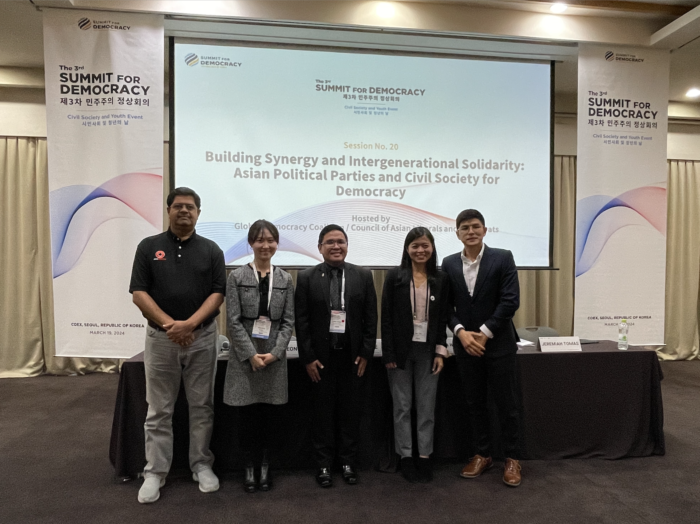
“The times call for cooperation, not for conflict or competition.”
This was the key message in the panel discussion organized by the Council of Asian Liberals and Democrats (CALD) on 19 March 2024 in Seoul, South Korea as part of the 3rd Summit for Democracy.
The Summit for Democracy was initiated by the United States under the administration of President Joe Biden “to renew democracy at home and to confront autocracies abroad.” The inaugural summit was held virtually in 2021, while the second summit in 2023 was conducted in hybrid format where the governments of Costa Rica, the Netherlands, Republic of Korea and Republic of Zambia co-hosted with the United States.
The 2024 summit, hosted by the South Korean government, was the first one to dedicate one full day for events organized by the cohorts, civil society and the youth. With the theme “Democracy for Future Generations”, the 3-day event also included a ministerial conference and a virtual plenary with heads of state and government.
The CALD panel discussion, held in cooperation with Asia Centre, was part of the “Partners for Democracy Day”, an initiative of the Global Democracy Coalition (GDC) “to provide a platform for civil society, international organizations, academic institutions, think tanks, philanthropic organizations and the private sector that want to make their voices heard in the Summit for Democracy discussions and the global democracy debate.” Both CALD and Asia Centre are members of the GDC.
CALD’s panel was entitled, “Building Synergy and Intergenerational Solidarity: Asian Political Parties and Civil Society for Democracy”, and was premised on the following:
Taking these into account, the panel aimed to identify the causes of this widening gap, facilitate understanding among various democratic actors on how to address the divide, and come up with recommendations on how to foster intersectoral and intergenerational cooperation among democratic actors.
The intersectoral, intergenerational and gender-balanced panel included the following as discussants: James Gomez, regional director of Asia Centre with over 25-year experience working for various INGOs, IOs, universities and think tanks; Alysa Wenli Chiu, deputy director of international affairs of the Democratic Progressive Party of Taiwan, with experience in electoral campaigns, both in Taiwan and the United States; Jeremiah Tomas, chairperson of the CALD Youth and Student Affairs Coordinator of the Youth Wing of the Liberal Party of the Philippines; and Jieun Jeong, graduate student and researcher in Korea University, focusing on human rights, gender equality, migration climate justice among others. The panel was moderated by Lito Arlegue, CALD executive director.
In the course of the panel discussion, the following were identified as the possible causes of the widening gap between democratic political parties and the youth/civil society:
To bridge the divide between these democratic forces, the members of the panel made the following recommendations:
The CALD panel was made possible with the support from International IDEA – an intergovernmental organization that supports democracy worldwide.
|
Categorised in: News Article
This post was written by CALD
 Unit 409, 4/F La Fuerza Plaza 2, 2241 Don Chino Roces Ave. corner Sabio St., 1231 Makati City, Philippines
Unit 409, 4/F La Fuerza Plaza 2, 2241 Don Chino Roces Ave. corner Sabio St., 1231 Makati City, Philippines
 +632 8819 60 71
+632 8819 60 71
 info@cald.org
info@cald.org